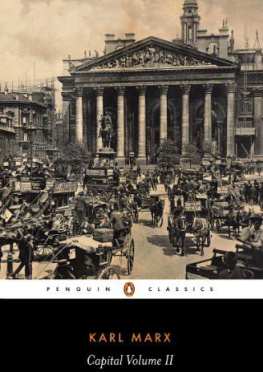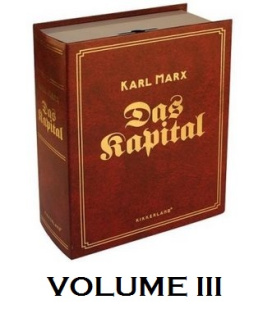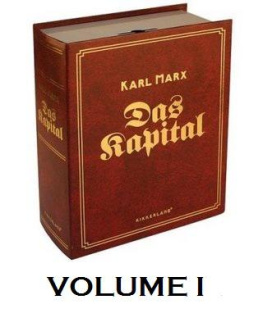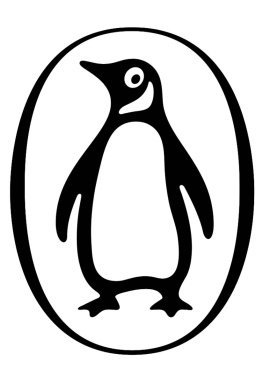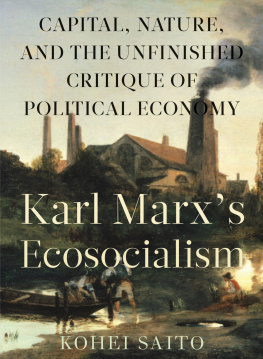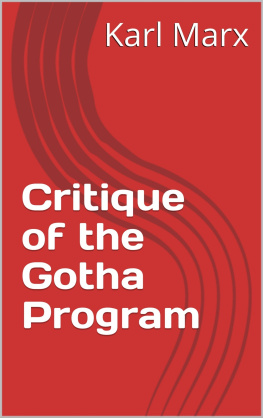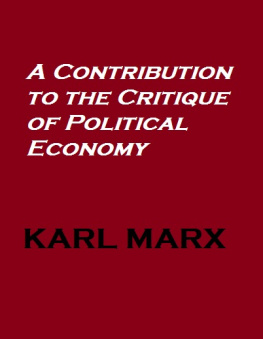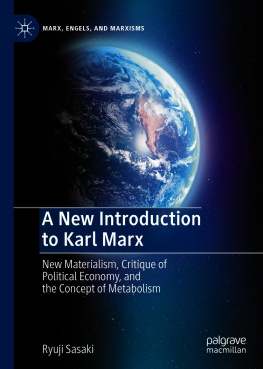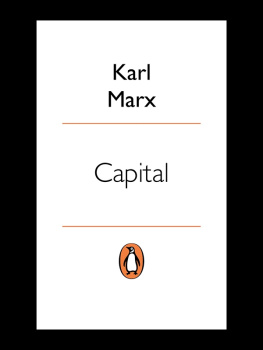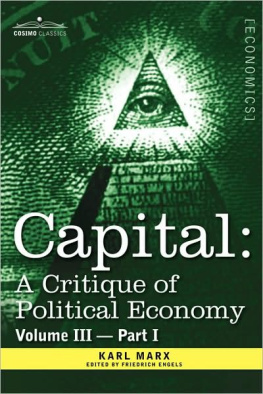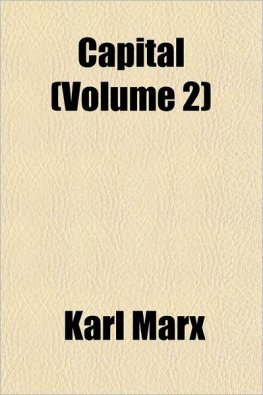Karl Marx - Capital: Critique of Political Economy
Here you can read online Karl Marx - Capital: Critique of Political Economy full text of the book (entire story) in english for free. Download pdf and epub, get meaning, cover and reviews about this ebook. year: 2006, publisher: Penguin Books Ltd, genre: Politics. Description of the work, (preface) as well as reviews are available. Best literature library LitArk.com created for fans of good reading and offers a wide selection of genres:
Romance novel
Science fiction
Adventure
Detective
Science
History
Home and family
Prose
Art
Politics
Computer
Non-fiction
Religion
Business
Children
Humor
Choose a favorite category and find really read worthwhile books. Enjoy immersion in the world of imagination, feel the emotions of the characters or learn something new for yourself, make an fascinating discovery.
Capital: Critique of Political Economy: summary, description and annotation
We offer to read an annotation, description, summary or preface (depends on what the author of the book "Capital: Critique of Political Economy" wrote himself). If you haven't found the necessary information about the book — write in the comments, we will try to find it.
Capital: Critique of Political Economy — read online for free the complete book (whole text) full work
Below is the text of the book, divided by pages. System saving the place of the last page read, allows you to conveniently read the book "Capital: Critique of Political Economy" online for free, without having to search again every time where you left off. Put a bookmark, and you can go to the page where you finished reading at any time.
Font size:
Interval:
Bookmark:


CAPITAL
VOLUME 2
KARL MARX was born at Trier in 1818 of a German-Jewish family converted to Christianity. As a student in Bonn and Berlin he was influenced by Hegels dialectic, but he later reacted against idealist philosophy and began to develop his theory of historical materialism. He related the state of society to its economic foundations and mode of production, and recommended armed revolution on the part of the proletariat. In Paris in 1844 Marx met Friedrich Engels, with whom he formed a life-long partnership. Together they prepared the Manifesto of the Communist Party (1848) as a statement of the Communist Leagues policy. In 1848 Marx returned to Germany and took an active part in the unsuccessful democratic revolution. The following year he arrived in England as a refugee and lived in London until his death in 1883. Helped financially by Engels, Marx and his family nevertheless lived in great poverty. After years of research (mostly carried out in the British Museum), he published in 1867 the first volume of his great work, Capital. From 1864 to 1872 Marx played a leading role in the International Working Mens Association, and his last years saw the development of the first mass workers parties founded on avowedly Marxist principles. Besides the two posthumous volumes of Capital compiled by Engels, Karl Marxs other writings include The German Ideology, The Poverty of Philosophy, The 18th Brumaire of Louis Bonaparte, The Civil War in France, A Contribution to the Critique of Political Economy, Grundrisse: Foundations of the Critique of Political Economy and Theories of Surplus-Value.
ERNEST MANDEL was born in 1923. He was educated at the Free University of Brussels, where he was later Professor for many years, and the cole Pratique des Hautes tudes in Paris. He gained his PhD from the Free University of Berlin. He was a Member of the Economic Studies Commission of FGTB (Belgian TUC) from 1954 to 1963 and was chosen for the annual Alfred Marshall Lectures by Cambridge University in 1978. His many books include The Formation of the Economic Thought of Karl Marx, Late Capitalism, The Long Waves of Capitalist Development, The Second Slump and The Marxist Theory of Bureaucracy. His influential pamphlet, An Introduction to Marxist Economics, sold over half a million copies and was translated into thirty languages. Ernest Mandel died in July 1995. In its obituary the Guardian described him as one of the most creative and independent-minded revolutionary Marxist thinkers of the post-war world.
KARL MARX
A Critique of
Political Economy
Volume Two
Introduced by
Ernest Mandel
Translated by
David Fernbach
Penguin Books
in association with New Left Review
PENGUIN BOOKS
Published by the Penguin Group
Penguin Books Ltd, 80 Strand, London WC2R 0RL, England
Penguin Putnam Inc., 375 Hudson Street, New York, New York 10014, USA
Penguin Books Australia Ltd, 250 Camberwell Road, Camberwell, Victoria 3124, Australia
Penguin Books Canada Ltd, 10 Alcorn Avenue, Toronto, Ontario, Canada M4V 3B2
Penguin Books India (P) Ltd, 11 Community Centre, Panchsheel Park, New Delhi 110 017, India
Penguin Books (NZ) Ltd, Cnr Rosedale and Airborne Roads, Albany, Auckland, New Zealand
Penguin Books (South Africa) (Pty) Ltd, 24 Sturdee Avenue, Rosebank 2196, South Africa
Penguin Books Ltd, Registered Offices: 80 Strand, London WC2R 0RL, England
www.penguin.com
New Left Review, 7 Carlisle Street, London W1
This edition first published in Pelican Books 1978
Reprinted in Penguin Classics 1992
17
Edition and notes copyright New Left Review, 1978
Introduction copyright Ernest Mandel, 1978
Translation copyright David Fernbach, 1978
All rights reserved
Except in the United States of America, this book is sold subject
to the condition that it shall not, by way of trade or otherwise, be lent,
re-sold, hired out, or otherwise circulated without the publishers
prior consent in any form of binding or cover other than that in
which it is published and without a similar condition including this
condition being imposed on the subsequent purchaser
The second volume is purely scientific, only dealing with questions from one bourgeois to another, wrote Frederick Engels to the Russian populist, Lavrov, on 5 February 1884. Seventeen months later, he told Sorge: The second volume will provoke great disappointment, because it is purely scientific and does not contain much material for agitation. Finally, on 13 November 1885, he wrote to Danielson: I had no doubt that the second volume would afford you the same pleasure as it has done to me. The developments it contains are indeed of such superior order that the vulgar reader will not take the trouble to fathom them and to follow them out. This is actually the case in Germany where all historical science, including political economy, has fallen so low that it can scarcely fall any lower. Our Kathedersozialisten have never been much more, theoretically, than slightly philanthropic Vulgrkonomen, and now they have sunk to the level of simple apologists of Bismarcks Staatssozialismus. To them, the second volume will always remain a sealed book Official economic literature observes a cautious silence with regard to it.
These predictions were to be verified far beyond Engelss fears. In fact, ten years passed before two young Russian Marxists Tugan-Baranowski followed by S. Bulgakov made the first application of the main conceptual innovations of Volume 2. And it took nearly another decade for these concepts finally to penetrate Germany and the Western world, through an international debate in which Tugan-Baranowski albeit Volume 2 of Capital has indeed been not only a sealed book, but also a forgotten one. To a large extent, it remains so to this very day.
Grave misunderstandings arise, however, if the reader attempts to pass straight from Volume 1 to Volume 3, under-estimating the key place of Volume 2 in the monumental theoretical construction. Marx himself quite precisely clarified this place, in a letter sent to Engels on 30 April 1868: In Book I we content ourselves with the assumption that if in the self-expansion process 100 becomes 110, the latter will find already in existence in the market the elements into which it will change once more. But now we investigate the conditions under which these elements are found at hand, namely the social intertwining of the different capitals, of the component parts of capital and of revenue (= s). This intertwining, conceived as a movement of commodities and of money, enabled Marx to work out at least the essential elements, if not the definitive form of a coherent theory of the trade cycle, based upon the inevitability of periodic disequilibrium between supply and demand under the capitalist mode of production. To forget this role of Volume 2 and jump to Volume 3 carries the danger of evacuating all problems specific to the inner contradictions of the commodity problems of the market, of the realization of value and surplus-value, etc. which, although touched upon in Volume 1, are only fully developed in Volume 2. We may even say that it was only by dealing with the reproduction of capital in its
Font size:
Interval:
Bookmark:
Similar books «Capital: Critique of Political Economy»
Look at similar books to Capital: Critique of Political Economy. We have selected literature similar in name and meaning in the hope of providing readers with more options to find new, interesting, not yet read works.
Discussion, reviews of the book Capital: Critique of Political Economy and just readers' own opinions. Leave your comments, write what you think about the work, its meaning or the main characters. Specify what exactly you liked and what you didn't like, and why you think so.

